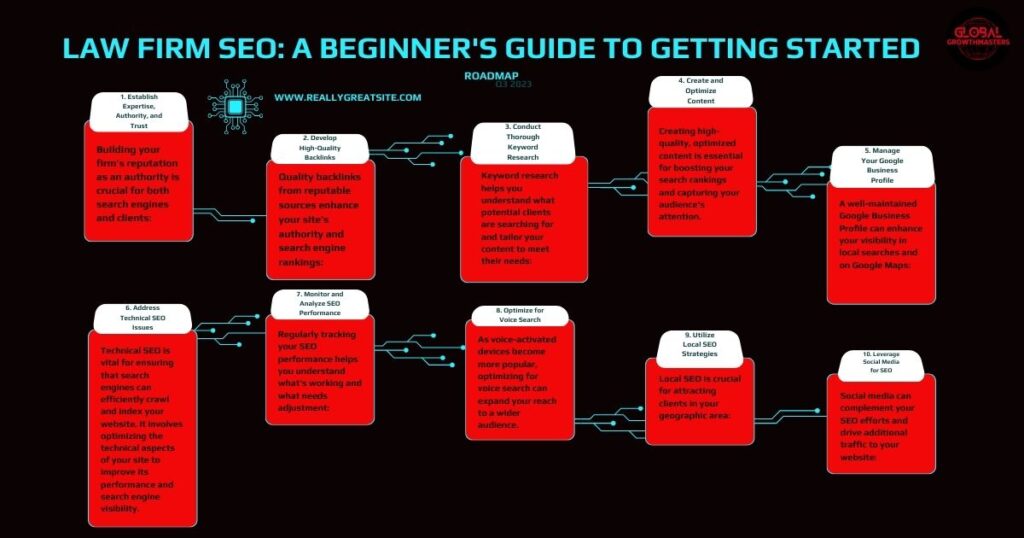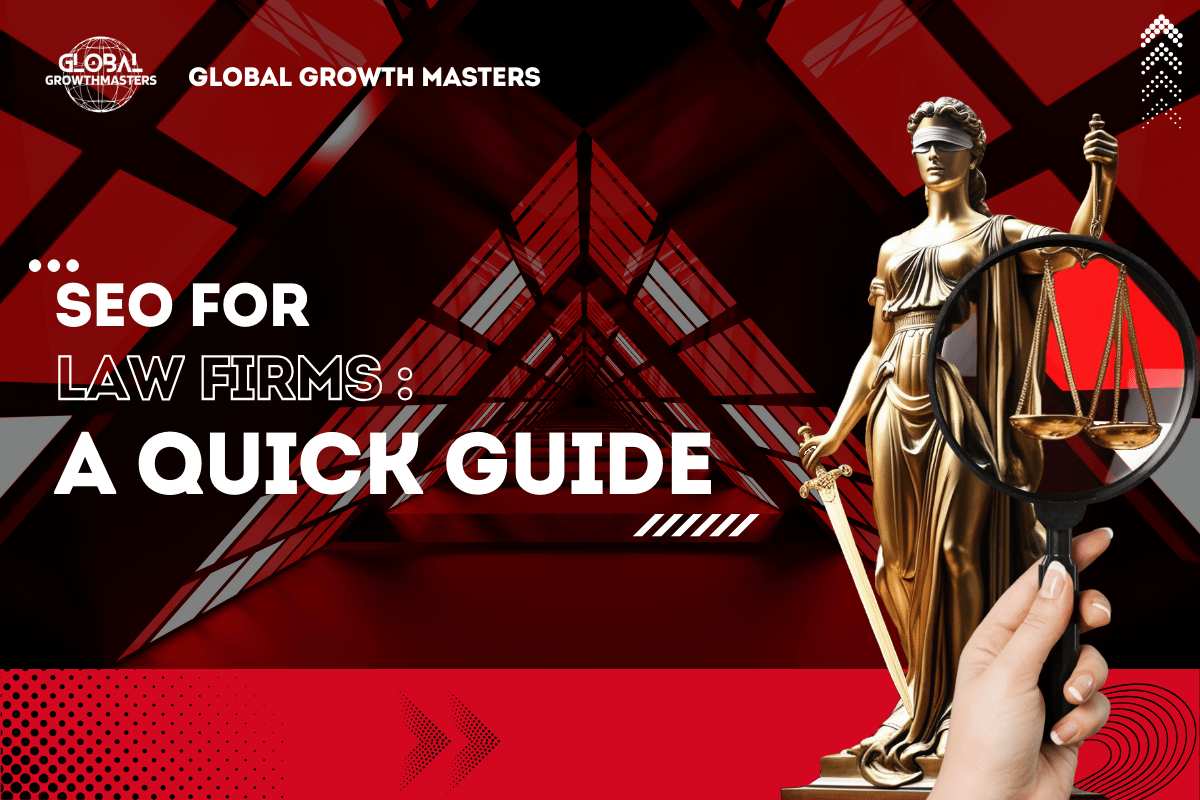In the digital age, establishing a strong online presence is crucial for law firms looking to stand out and attract clients.Law firm search engine optimization (SEO) is a strategic approach to improving your firm’s visibility in search engine results without relying on paid ads. By focusing on SEO, you can attract more potential clients and build a stronger online reputation.
Why SEO Matters for Law Firms
SEO is vital for law firms aiming to stand out in a competitive market. It offers a cost-effective method to increase online visibility and drive relevant traffic to your site. Unlike paid advertising, which provides short-term results, SEO delivers long-lasting benefits:
- Increased Visibility: Higher search engine rankings mean more exposure to potential clients.
- Cost-Effectiveness: SEO typically offers a better return on investment than traditional marketing.
- Long-Term Gains: Effective SEO efforts provide ongoing visibility and traffic.
Top 10 SEO Tactics for Law Firms
1. Establish Expertise, Authority, and Trust
Building your firm’s reputation as an authority is crucial for both search engines and clients:
- Content Creation: Regularly publish detailed blog posts, case studies, and articles that highlight your expertise.
- Showcase Credentials: Display your firm’s qualifications, awards, and certifications prominently on your website.
- Client Testimonials: Feature glowing reviews and testimonials to build trust with potential clients.
2. Develop High-Quality Backlinks
Quality backlinks from reputable sources enhance your site’s authority and search engine rankings:
- Guest Blogging: Contribute articles to respected legal and industry blogs to gain backlinks.
- Industry Partnerships: Collaborate with professionals and organizations for backlink opportunities.
- Local Listings: Ensure your firm is listed in relevant legal and business directories.
3. Conduct Thorough Keyword Research
Keyword research helps you understand what potential clients are searching for and tailor your content to meet their needs:
- Targeted Keywords: Focus on phrases like “best Law Firm SEO” and “Attorney SEO Agency” to attract relevant traffic.
- Long-Tail Keywords: Use specific phrases like “affordable SEO services for law firms” to capture niche searches.
4. Create and Optimize Content
Creating high-quality, optimized content is essential for boosting your search rankings and capturing your audience’s attention.
- On-Page SEO: Integrate keywords naturally into your titles, headers, and body text.
- Local SEO: Use location-specific keywords to attract clients in your area.
- Content Quality: Ensure your content is well-written, informative, and relevant to your target audience.

5. Manage Your Google Business Profile
A well-maintained Google Business Profile can enhance your visibility in local searches and on Google Maps:
- Accurate Information: Keep your address, phone number, and business hours up to date.
- Client Reviews: Encourage clients to leave positive reviews and respond to their feedback.
- Visual Content: Add high-quality photos of your office and team to your profile.
6. Address Technical SEO Issues
Technical SEO is vital for ensuring that search engines can efficiently crawl and index your website. It involves optimizing the technical aspects of your site to improve its performance and search engine visibility.
What is Technical SEO?
Technical SEO refers to the optimization of a website’s technical elements to help search engines crawl, index, and understand the site’s content more effectively. It includes activities such as improving site speed, ensuring mobile-friendliness, and addressing crawl errors.
Importance of Technical SEO
- Improves Crawlability and Indexability: Ensures search engines can access and understand your site’s content without obstacles.
- Enhances User Experience: A well-optimized site provides a better user experience with fast load times and easy navigation.
- Boosts Search Rankings: Resolving technical issues can positively impact your search engine rankings.
- Prevents Errors and Issues: Identifies and fixes problems like broken links and duplicate content, maintaining site health and avoiding penalties.
Best Practices for Technical SEO
- Optimize Site Speed: Improve loading times by compressing images, minimizing JavaScript and CSS, and enabling browser caching.
- Ensure Mobile-Friendliness: Use responsive design and test your site on various mobile devices for optimal usability.
- Implement Structured Data: Use schema markup to enhance search engine understanding and improve visibility in search features.
- Optimize URL Structure: Maintain clear, descriptive URLs and a consistent site hierarchy.
- Fix Crawl Errors: Monitor and repair crawl errors using Google Search Console and ensure your XML sitemap is up to date.
- Enhance Site Security: Implement HTTPS and keep your software and plugins updated.
- Improve Internal Linking: Use contextual links and maintain an HTML sitemap for better navigation.
- Handle Duplicate Content: Use canonical tags and noindex tags to address duplicate content issues.
- Optimize for Voice Search: Use natural language and create an FAQ page to capture voice search queries.
- Regularly Audit Your Site: Conduct SEO audits using tools like Screaming Frog or SEMrush to identify and resolve technical issues.
7. Monitor and Analyze SEO Performance
Regularly tracking your SEO performance helps you understand what’s working and what needs adjustment:
- Traffic Analysis: Use tools like Google Analytics to track changes in organic traffic and user behavior.
- Keyword Performance: Evaluate how well your keywords are performing and refine your strategy as needed.
- Conversion Tracking: Measure how effectively your SEO efforts translate into client inquiries and conversions.
8. Optimize for Voice Search
As voice-activated devices become more popular, optimizing for voice search can expand your reach to a wider audience.
- Conversational Keywords: Use natural, conversational language in your content to align with voice search queries.
- FAQs: Create a frequently asked questions (FAQ) page that addresses common legal questions and queries.
- Local Information: Ensure your local business information is accurate and easily accessible for voice searches.
9. Utilize Local SEO Strategies
Local SEO is crucial for attracting clients in your geographic area:
- Local Keywords: Incorporate location-based keywords in your content, titles, and meta descriptions.
- Local Citations: Ensure your firm is listed consistently across local directories and citation sites.
- Community Engagement: Participate in local events and engage with the community to increase local visibility.
10. Leverage Social Media for SEO
Social media can complement your SEO efforts and drive additional traffic to your website:
- Share Content: Promote your blog posts, articles, and legal insights on social media platforms to increase reach.
- Engage with Followers: Interact with your audience and respond to their questions or comments.
- Build Relationships: Connect with influencers and industry leaders to expand your online network and gain backlinks.
Conclusion
Implementing a comprehensive SEO strategy is essential for law firms looking to enhance their online visibility and attract more clients. By focusing on these top 10 SEO tactics, you can improve your search rankings, build a stronger online presence, and achieve long-term success. Whether you’re partnering with an Attorney SEO Agency or seeking affordable SEO services, investing in these practices will lead to greater visibility and client engagement.
For expert guidance on optimizing your law firm’s SEO, Global Growth Masters is here to help. Contact us to navigate the complexities of digital marketing and achieve your growth goals.

